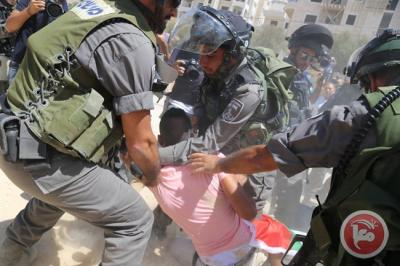
Israeli forces clash with Palestinian Christians

Palestinian Christians clashed with Israeli forces following Sunday mass on Aug. 30 when demonstrators, including priests, marched to protest renewed work on Israel's controversial separation wall in the Christian-majority town of Beit Jala in the occupied West Bank. The march, the latest in a string of protests, moved through neighborhoods in the Bethlehem-district town where Israeli forces are extending the separation wall, which is considered illegal under international law. Israeli forces shot tear-gas at protesters and physical altercations broke out when troops attempted to suppress the protest. Two protesters were arrested for allegedly throwing stones at soldiers guarding the construction zone, police said.
Several clergymen participated in the march, including Archbishop and former Latin patriarch of Jerusalem, Michel Sabbah. Sabbah denounced the work that began earlier this month. "This land belongs to us," he said. "Whatever they do, whatever their courts say, this land belongs to us and it will return to us one day. You are stronger with your guns, but you are not the strongest when it comes to humanity."
In addition to the separation wall, protesters also condemned the nearby illegal Israeli settlements of Gilo and Har Gilo, which they fear will be expanded if construction on the wall goes ahead. Archbishop Sabbah urged the world to support the people of Beit Jala in their battle against the separation wall and called on the Palestinian Authority to bring attention to Israeli violations against Palestinians.
A nearly 60-kilometer stretch of the wall already cuts through Bethlehem district and is built on Palestinian land, the UN Office for the Coordination for Humanitarian Affairs reports. Israel's high court ruled in April that work through Beit Jala must stop and told the government to consider alternative routes. However, on July 6 the court reversed the decision, ruling that the ban referred only to an area of a few hundred meters alongside a monastery in the town's Cremisan Valley.
Walid Assad, the head of a local group, the Colonization and Wall Resistance Commission, said that demonstrators rejected the Israeli authorities' aim to seize Palestinian land and isolate Palestinian communities in the area. Assaf said that details of Israel's confiscation of Palestinians land in Beit Jala ought to be submitted to the International Criminal Court.
Mazin Qumsiyeh, a popular resistance activist, added that the separation wall would destroy nature in the area by uprooting of trees and plants necessary for its expansion.
Earlier this month, European Union missions in Jerusalem and Ramallah said they were "concerned" about the renewed construction work in Cremisan, noting that it will directly affect the livelihoods of 58 families. A 15-member delegation of European Union diplomats later visited Beit Jala to assess the situation. Local Christian landowners said that construction of the wall could ultimately force them to emigrate and would "cleanse" the area of its Christian residents.
Israel began building the separation wall with concrete slabs, fences and barbed-wire inside the occupied West Bank in 2002 at the height of the Second Intifada, or uprising, claiming that it was crucial for security. The International Court of Justice ruled in 2004 that construction of the wall was illegal and, like the UN General Assembly, demanded that it be dismantled.
Palestinians, many of whom refer to it as the "apartheid wall," say the wall is a land-grab, pointing out that when complete, 85% of it will have been built inside the West Bank. The wall has already completely cut off occupied East Jerusalem from the rest of the West Bank.
The Applied Research Institute in Jerusalem says the wall will effectively annex around 13% of the total area of the West Bank. Palestinians living in the Bethlehem district have already lost a substantial amount of land due to the wall and the expansion of 19 Jewish-only settlements and outposts in the area.
From Ma'an News Agency, Aug. 30
